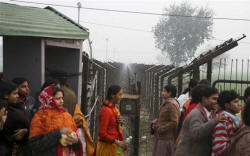 |
Other
News... sponsored by Richardson Repair & A-Plus Flooring |

 Pakistan army: We must 'avoid conflict' with India
Pakistan army: We must 'avoid conflict' with India
[December 29, 2008]
ISLAMABAD, Pakistan (AP)
--
Gen. Ashfaq Parvez Kayani's remarks were believed to be his first about the strained relationship and could reassure a jittery region that Pakistan does not intend to escalate the crisis further.
|
On Friday, Pakistani intelligence officials said thousands of troops were being shifted toward the Indian border, though there has been no sign yet of a major build up at the frontier. Without referring specifically to the tensions, Kayani "highlighted the need to de-escalate and avoid conflict in the interest of peace and security," a brief army statement said. Kayani made the statement in talks with Chinese Vice Foreign Minister He Yafei, who is visiting Pakistan, the release said. India blames Pakistani militants for the slaughter of 164 people in its commercial capital and has not ruled out the use of force in its response. Pakistan's civilian leaders have said they do not want war, but will retaliate if attacked. Despite being under civilian control, analysts say Pakistan's army and intelligence agencies wield enormous influence on decision-making. Some say they are more powerful than the country's elected leaders. Nuclear-armed Pakistan and India have fought three wars since 1960 -- two over Kashmir, a majority Muslim region in the Himalayas claimed by both countries. |

